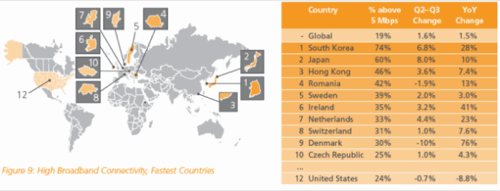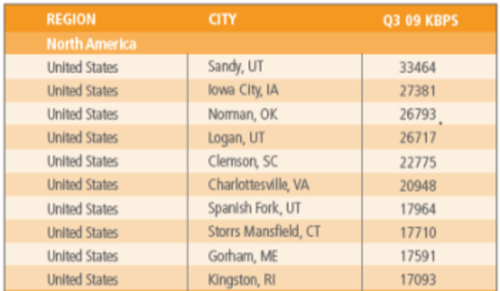Looking at data from the third quarter of 2009, content delivery network Akamai just announced that the average broadband speed in the U.S. declined by 2.4% in the third quarter of 2009 compared to the same quarter in 2008.
In the U.S., Delaware currently leads with 7.2 Mbps, though it remains far behind South Korea, where the average speed is almost 15 Mpbs. Currently, the U.S. is in 18th place, far behind Japan, Hong Kong, Romania and Sweden. The average U.S. broadband speed is currently 3.9 Mbps.

If you are looking for a fast Internet connection in the U.S., Sandy, UT and Iowa City currently offer the fastest connections. Delaware (7.2 Mbps), New Hampshire (5.9 Mbps) and Massachusetts (5.9 Mbps) are the top 3 states on Akamai’s list. The states with the fastest average broadband speeds can all be found on the East Coast.
It is interesting to speculate why average speed in the U.S. declined over the last year. Chances are that a lot of people downsized their connections during the economic downturn. If you have a theory, let us know in the comments.

IP Addresses: U.S. Leads but China is Catching Up
Akamai’s quarterly report also notes that the number of unique IP addresses increased by about 4.5% globally since the second quarter of 2009. The U.S. is still home to the largest number of unique IP addresses, but China is catching up quickly. In total, the U.S. was home to just over 119 million unique IP addresses in Q3 2009. With 49 million IP addresses, China is currently a distant second, but the number of Chinese IP addresses increased by 30% compared to Q2 2009, while U.S. addresses on increased by 9%.

Attack Traffic
Akamai also looked at where most of the traffic from botnets and other attack traffic originated from. Russia (13%) is currently the source of most of this traffic, followed by Brazil (8.6%) and the U.S. (6.9%). On a positive note, it’s important to note that attack traffic from the U.S. declined from 15% compared to Q2 2009. Attack traffic from China declined even more. In Q2 2009, 31% of all of this traffic originated in China. Now, China is only responsible for about 6.5% of all attack traffic.
Most of these attacks (78%) target port 445. On Windows systems, port 445 handles local printer and file sharing traffic.






















